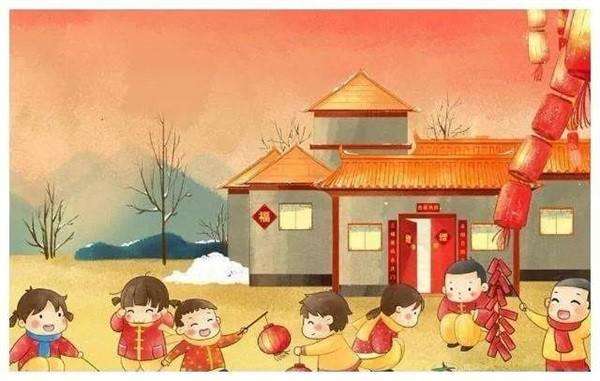(单词翻译:单击)
听力文本
Hello and welcome to the VOA Learning English program Words and Their Stories.
Everyone around the world celebrates the New Year differently and at different times. Most people in the U.S. celebrate it on January 1. But they may also observe New Year traditions from other religions or cultures.
For example, many Asian cultures celebrate the Lunar New Year. This date changes from year to year. The date of the Islamic New Year also changes from year to year. And in India, each religious group has its own date for the beginning of the year. For example, the Hindu New Year comes in April or May.

No matter when you celebrate the New Year, it usually involves thinking about the past year and planning for the year ahead.
People have many different ways of ringing out the old and ringing in the new. But why are bells linked to the calendar change?
In the Christian and Buddhist religions, bells are often connected with the New Year. The website CatholicCulture.org explains that "bells serve as a beautiful symbol introducing a new year to be spent together as a community of families ..."
Another website describes how bells are used in Japan on New Year's Eve. "As midnight approaches, Buddhist temples around the country begin ringing out the old year, sounding the temple bell 108 times." Each ring of the bell stands for each of the earthly desires a Buddhist must try to overcome -- all 108 of them!
Even those who aren't religious but are a little superstitious, may ring bells at the stroke of midnight on New Year's Eve to scare off bad luck.
These age-old traditions have given us the phrase "to ring out the old and ring in the new".
The English poet Alfred Lord Tennyson (1809-1892) made the phrase popular with his poem "In Memoriam (Ring Out, Wild Bells)". In this poem, Tennyson rings out, or says farewell to, the bad, and he rings in, or says hello, to the good.
Tennyson wrote this poem for Arthur Henry Hallam. The two students met at Cambridge University and quickly became best friends, both showing great promise as writers. Hallam helped Tennyson publish volumes of his poetry in 1830 and 1832.
The friends almost became family when Hallam became engaged to the poet's sister, Emily. However, before they could wed, Hallam died of a brain hemorrhage. He was only twenty-two years old.
To remember his good friend, Tennyson wrote the poem "In Memoriam". He also named one of his two sons Hallam.
Here is Jonathan Evans reading the first part of that poem.
Ring out, wild bells, to the wild sky,
The flying cloud, the frosty light:
The year is dying in the night;
Ring out, wild bells, and let him die.
Ring out the old, ring in the new,
Ring, happy bells, across the snow:
The year is going, let him go;
Ring out the false, ring in the true.
Ring out the grief that saps the mind
For those that here we see no more;
Ring out the feud of rich and poor,
Ring in redress to all mankind.
Ring out a slowly dying cause,
And ancient forms of party strife;
Ring in the nobler modes of life,
With sweeter manners, purer laws.
Thanks, Jonathan. And thank you, our listeners, for the time you have spent reading and listening to Words and Their Stories these past twelve months.
We here at VOA Learning English wish all of you a happy start to the New Year.
For the New Year, what do you plan to ring out and what do you plan to ring in? Also in the coming New Year, what words, expressions or phrases would you like to learn more about? Let us know in the Comments Sections.
I'm Anna Matteo.
All of those who are hither and yonder
With love in our heart we grow fonder and fonder
Hail to those who we hold so dear
And hail to those who are gathered here
And a happy new year to all that is living
To all that is gentle kind and forgiving
重点解析
1.be connected with 与……相连/联系
I always considered your brother to be connected with that club.
我原来总认为你兄弟和那个俱乐部有关系。
2.be linked to 与……有联系;与……有关;与……相联系
He said that he and I should not be linked to one of the links.
他说他为了我和不该联系的人都不联系了。
3.die of 死于(疾病、过度悲伤等);强烈地感受到……,……得要命
Millions could die of hunger as an indirect result of the war
作为战争的间接后果,数百万人可能会死于饥饿。
参考译文
大家好,欢迎进入VOA学英语《词汇掌故》节目。
世界上的每个人都在不同的时间以不同的方式庆祝新年。美国大部分人在1月1日庆祝新年,但是他们也会遵从其他宗教或者文化的新年传统。
例如,许多亚洲文化庆祝农历新年。新年的日期每年都会不一样。伊斯兰新年的日子每年也是变动的。在印度,每个宗教组织都有自己的新年日期。比如印度教新年是在四月或是五月。
不论你是什么时候庆祝新年,都会涉及到思忆过去的一年,展望新的一年。
人们有许多种在钟声中辞旧迎新的方式。但是为什么钟声会和日历变更联系在一起呢?
在基督教和佛教中,钟声往往和新年相关。网站“天主教会”解释其缘由为:“人们认为钟声是社会家庭共同度过新年的一个美好象征……”
另一个网站描述了日本新年前夕钟声的用法。“随着零点到来,全国的佛寺开始敲响寺钟108次来辞旧。”每一声钟响代表一个僧侣必须要去克服的一种尘世欲望,总共要克服108种!
即使是那些不信教的人也是有点迷信的,他们会祈愿除夕夜敲响的钟声能赶走坏运。
这些古老的传统衍生出了一个短语“to ring out the old and ring in the new(辞旧迎新)”。
这个短语因英国诗人阿尔弗雷德·丁尼生爵士(1809-1892)的诗歌《悼念(响起,狂野的钟声)》而流传开来。在这首诗中,丁尼生和厄运告别,并向好运问好。
丁尼生的这首诗是为亚瑟·亨利·哈兰姆而作。这两个人学生时代在剑桥大学相遇并迅速成为挚友,两个人都誓要成为作家。哈勒姆帮助丁尼生出版了其在1830年和1832年的诗集。
在哈勒姆在和和丁尼生姐姐订婚之后,这对朋友几乎就是一家人了。可惜,在婚礼之前,哈勒姆因脑出血逝世了,那时他才年仅22岁。
为了纪念他的好朋友,丁尼生写了这首《悼念》。他还将自己两个儿子中的一个取名“哈勒姆”。
下面由乔纳森·埃文斯为您朗读诗歌的第一部分。
敲吧,急骤的钟,
向着骤雪,向着乱云和霜天的霞光;
旧岁正在这在夜色中消亡,
敲吧,急骤的钟,让其殒灭。
敲吧,敲走旧的,敲来新的,
让欢乐的钟声穿霜度零;
旧岁在离去,就让它离去,
鼓吧,敲走假的,敲来真的。
敲吧,为作古的一切致哀,
敲走使心灵滴血的悲痛;
敲走贫富间的新伙旧恨,
把补救为全体人类敲来。
敲吧,敲走渐渐死的宗旨
和古来的种种党同伐异;
敲来完美的法律和风习,
敲来较高尚的生活方式。
谢谢,乔纳森。感谢我们的听众,感谢你们过去一年中阅读和收听我们的节目。
在这里,我们VOA学英语的所有人祝愿大家新年新气象。
你打算怎么辞旧迎新呢?同样,在新的一年到来之际,你想更多学习什么单词、表达或者短语呢?在评论区告诉我们吧。
我是安娜·马特奥。
无论远近的所有朋友
随着我们心中的爱我们越来越快乐和美好
向那些我们珍视的人们致敬
向这里聚会的人们致敬
祝生活中的所有人新年快乐
致敬所有温柔善良和宽容的人


